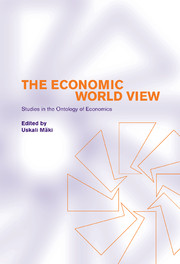Book contents
- Frontmatter
- Contents
- Notes on the contributors
- Preface
- I The what, why, and how of economic ontology
- 1 Economic ontology: what? why? how?
- 2 The empirical presuppositions of metaphysical explanations in economics
- 3 Quality and quantity in economics: the metaphysical construction of the economic realm
- II Rationality and homo economicus
- Part III Micro, macro, and markets
- Part IV The world of economic causes
- Part V Methodological implications of economic ontology
- Name index
- Subject index
1 - Economic ontology: what? why? how?
Published online by Cambridge University Press: 04 August 2010
- Frontmatter
- Contents
- Notes on the contributors
- Preface
- I The what, why, and how of economic ontology
- 1 Economic ontology: what? why? how?
- 2 The empirical presuppositions of metaphysical explanations in economics
- 3 Quality and quantity in economics: the metaphysical construction of the economic realm
- II Rationality and homo economicus
- Part III Micro, macro, and markets
- Part IV The world of economic causes
- Part V Methodological implications of economic ontology
- Name index
- Subject index
Summary
So you're an economist? You study everything that can be gauged by the measuring rod of money? You view human interaction in terms of supply and demand in the market? You depict human action as seeking selfinterest in a calculative manner? Is this indeed your view of the world? If you are an economist and somebody has attempted, or might attempt, to embarrass you with such questions, you should read this book. If you are a non-economist inclined to raise such questions, you too should study the essays collected in this volume. If you are a philosopher interested in the peculiar characteristics of the ‘dismal science', this is a book to read. The book examines aspects of the economic world view from a variety of perspectives by raising shamelessly deep questions. This is a book in the ontology of economics.
What?
What is the economy made of? What are its constituents and how do they hang together? What kind of general principles govern its functioning, and its change? Are they causal principles and, if so, what is the nature of economic causation? What drives economic actors, and what mental capacities do they possess? What is utility, or well-being? What is uncertainty, or risk? Do aggregates exist? Do individual preferences and social institutions exist, and in what sense? Are (any of) these things historically and culturally invariant universals, or are they relative to context? These are some questions about the economy.
- Type
- Chapter
- Information
- The Economic World ViewStudies in the Ontology of Economics, pp. 3 - 14Publisher: Cambridge University PressPrint publication year: 2001
- 19
- Cited by



